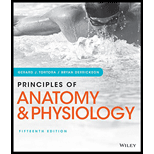
Principles of Anatomy and Physiology
15th Edition
ISBN: 9781119329398
Author: Gerard J Tortora, Bryan Derrickson
Publisher: John Wiley & Sons Inc
expand_more
expand_more
format_list_bulleted
Concept explainers
Textbook Question
Chapter 1, Problem 15CP
Locate the nine abdominopelvic regions and the four abdominopelvic quadrants on yourself, and list some of the organs found in each.
Expert Solution & Answer
Trending nowThis is a popular solution!

Students have asked these similar questions
Briefly state the physical meaning of the electrocapillary equation (Lippman equation).
Explain in a small summary how:
What genetic information can be obtained from a Punnet square? What genetic information cannot be determined from a Punnet square?
Why might a Punnet Square be beneficial to understanding genetics/inheritance?
In a small summary write down:
Chapter 1 Solutions
Principles of Anatomy and Physiology
Ch. 1 - What body function might a respiratory therapist...Ch. 1 - Give your own example of how the structure of a...Ch. 1 - Define the following terms: atom, molecule, cell,...Ch. 1 - 4. At what levels of organization would an...Ch. 1 - Referring to Table 1.2, which body systems help...Ch. 1 - List the six most important life processes in the...Ch. 1 - 7. Describe the locations of intracellular fluid,...Ch. 1 - Why is extracellular fluid the internal...Ch. 1 - Prob. 9CPCh. 1 - Checkpoint 10:
Define receptor, control center,...
Ch. 1 - What is the difference between symptoms and signs...Ch. 1 - Checkpoint 12:
Which directional terms can be used...Ch. 1 - Locate each region shown in Figure 1.6 on your own...Ch. 1 - Checkpoint 14:
What structures separate the...Ch. 1 - Locate the nine abdominopelvic regions and the...Ch. 1 - Checkpoint 16:
What are some of the signs of...Ch. 1 - Checkpoint 17:
Which forms of medical imaging...Ch. 1 - Checkpoint 18:
Of the medical imaging techniques...Ch. 1 - Checkpoint 19:
Which medical imaging technique...Ch. 1 - Prob. 1CTQCh. 1 - CTQ 2: There is much interest in using stem cells...Ch. 1 - CTQ 3: On her first anatomy and physiology exam,...
Additional Science Textbook Solutions
Find more solutions based on key concepts
Which of the following statements about the general functions of the nervous system is false?
The three primary...
Human Anatomy & Physiology (2nd Edition)
1. ___ Mitosis 2. ___ Meiosis 3. __ Homologous chromosomes 4. __ Crossing over 5. __ Cytokinesis A. Cytoplasmic...
Microbiology with Diseases by Body System (5th Edition)
All of the following terms can appropriately describe humans except: a. primary consumer b. autotroph c. hetero...
Human Biology: Concepts and Current Issues (8th Edition)
6. A velocity vector 40º above the positive x-axis has a y-component of 10 m/s. What is the value of its x-comp...
College Physics: A Strategic Approach (3rd Edition)
If someone at the other end of a room smokes a cigarette, you may breathe in some smoke. The movement of smoke ...
Campbell Essential Biology with Physiology (5th Edition)
The data were obtained from a use-dilution test comparing four disinfectants against Salmonella choleraesuis. G...
Microbiology: An Introduction
Knowledge Booster
Learn more about
Need a deep-dive on the concept behind this application? Look no further. Learn more about this topic, biology and related others by exploring similar questions and additional content below.Similar questions
- Not part of a graded assignment, from a past midtermarrow_forwardNoggin mutation: The mouse, one of the phenotypic consequences of Noggin mutationis mispatterning of the spinal cord, in the posterior region of the mouse embryo, suchthat in the hindlimb region the more ventral fates are lost, and the dorsal Pax3 domain isexpanded. (this experiment is not in the lectures).a. Hypothesis for why: What would be your hypothesis for why the ventral fatesare lost and dorsal fates expanded? Include in your answer the words notochord,BMP, SHH and either (or both of) surface ectoderm or lateral plate mesodermarrow_forwardNot part of a graded assignment, from a past midtermarrow_forward
- Explain in a flowcharts organazing the words down below: genetics Chromosomes Inheritance DNA & Genes Mutations Proteinsarrow_forwardplease helparrow_forwardWhat does the heavy dark line along collecting duct tell us about water reabsorption in this individual at this time? What does the heavy dark line along collecting duct tell us about ADH secretion in this individual at this time?arrow_forward
arrow_back_ios
SEE MORE QUESTIONS
arrow_forward_ios
Recommended textbooks for you
- Basic Clinical Lab Competencies for Respiratory C...NursingISBN:9781285244662Author:WhitePublisher:Cengage
 Comprehensive Medical Assisting: Administrative a...NursingISBN:9781305964792Author:Wilburta Q. Lindh, Carol D. Tamparo, Barbara M. Dahl, Julie Morris, Cindy CorreaPublisher:Cengage Learning
Comprehensive Medical Assisting: Administrative a...NursingISBN:9781305964792Author:Wilburta Q. Lindh, Carol D. Tamparo, Barbara M. Dahl, Julie Morris, Cindy CorreaPublisher:Cengage Learning - Case Studies In Health Information ManagementBiologyISBN:9781337676908Author:SCHNERINGPublisher:Cengage

Basic Clinical Lab Competencies for Respiratory C...
Nursing
ISBN:9781285244662
Author:White
Publisher:Cengage

Comprehensive Medical Assisting: Administrative a...
Nursing
ISBN:9781305964792
Author:Wilburta Q. Lindh, Carol D. Tamparo, Barbara M. Dahl, Julie Morris, Cindy Correa
Publisher:Cengage Learning



Case Studies In Health Information Management
Biology
ISBN:9781337676908
Author:SCHNERING
Publisher:Cengage

Dissection Basics | Types and Tools; Author: BlueLink: University of Michigan Anatomy;https://www.youtube.com/watch?v=-_B17pTmzto;License: Standard youtube license